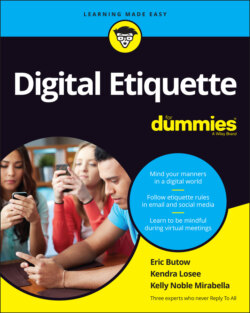Читать книгу Digital Etiquette For Dummies - Eric Butow - Страница 55
Conducting your business online
ОглавлениеIf you’re a glutton for punishment and make your way through all the clauses and subclauses of the CAN-SPAM Act, you may end up thinking that there's no way you can end up doing any business online. The good news is that the FTC has anticipated your doubt and preemptively answers a lot of frequently asked questions — you know, FAQs. We’ve summarized those questions and answers for you in the following list:
The three information types: The CAN-SPAM Act applies depending on the primary purpose of the email message. The FTC has three different types of information:Commercial content, which advertises or promotes a commercial product, commercial service, or website that’s operated for a commercial product or serviceTransactional or relationship content, which is content about a transaction you’ve already agreed to with the other party, as well as updates sent to a customer about an ongoing transactionOther content, which doesn’t fit into one of the other two categoriesIf you’re guessing that your email falls into the commercial category, then pass Go and collect your 200 dollars — the email is governed by the CAN-SPAM Act.
Combo guidelines: What happens if your email contains both commercial content and one or both of the other two types of content? The primary purpose of the message decides: If the email Subject line and/or body of the message would cause the recipient to conclude that the message is of a commercial nature, the message falls under the CAN-SPAM Act.
Who’s responsible?: If your message is sent by more than one company, such as one designed to announce a partnership between you and other companies to sell products, you can have one of the other companies send the message for CAN-SPAM compliance.The From line in the message must be from an account with that other company and must comply with all other CAN-SPAM requirements. If they don’t, all the companies listed in the message will be held liable, so be sure that the other company knows CAN-SPAM backward and forward.
Forward properly: Speaking of forwarding, if you want to have a message with a link to invite readers to forward your email to a friend, the sender may be required to comply with the CAN-SPAM Act.Has the person or company selling the product or service offered to pay the forwarder in some way, such as with a cash payment or in exchange for a benefit such as driving traffic to the forwarder’s website? Then the seller is the person or company responsible for following CAN-SPAM guidelines.
If you want to view the FAQs in their entirety to gather more information and see examples, head on over to the FTC: www.ftc.gov/tips-advice/business-center/guidance/can-spam-act-compliance-guide-business.
